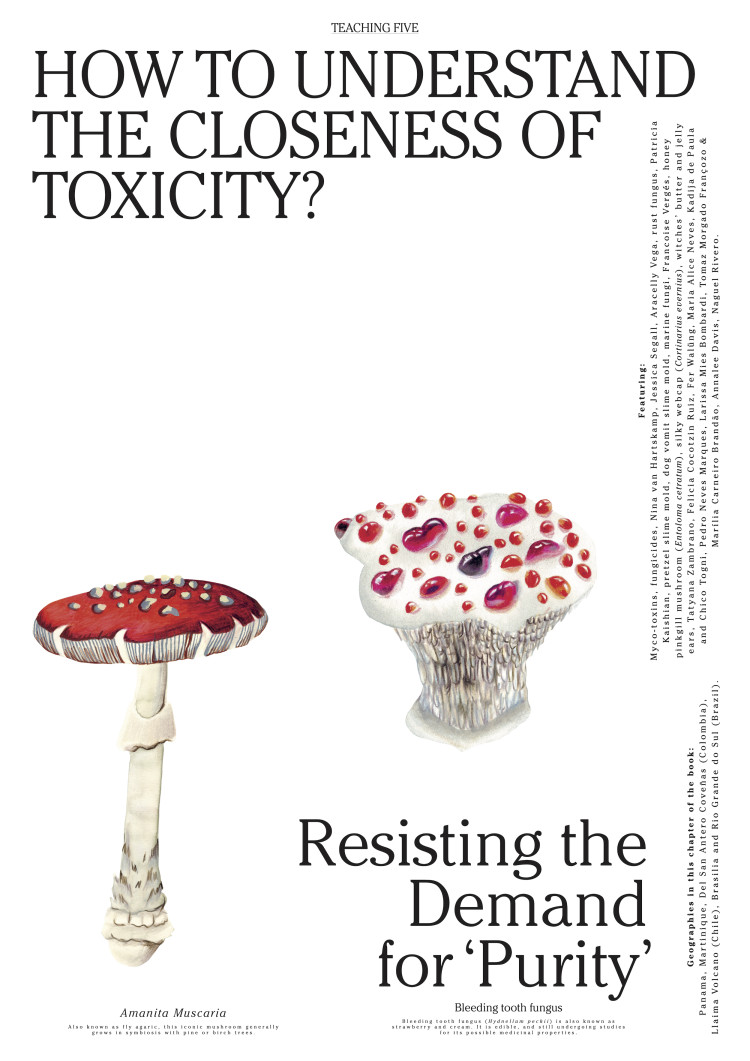Sat 14 October
12:00–19:00
Workshop by Yasmine Ostendorf-Rodríguez and Lecture by Alexis Shotwell — HOW TO UNDERSTAND THE CLOSENESS OF TOXICITY?
RADIUS is delighted to host a workshop by Yasmine Ostendorf-Rodríguez, based on teaching number five from the recently published book Let’s Become Fungal: Mycelium Teachings and the Arts (Valiz, 2023). This event is a collaboratively crafted, mycelial program of twelve entangled activities. The book takes its inspiration from the world of art and mycology and shares innovative practices from Latin America and the Caribbean that are rooted in multi-species collaboration, symbiosis, alliances, non-monetary resource exchange, decentralisation, bottom-up methods and mutual dependency—all in line with the behaviour of the mycelium.
The twelve activities are each connected to one of the twelve chapters of the book and take place from Medellín to Seoul, Taipei to Rio de Janeiro and from Barbados to Delft. The event in RADIUS will pivot around the question ‘How to Understand the Closeness of Toxicity?’ and will delve into the ways we can resist the demand for ‘purity’ and reveal the idea of purity as an illusion and as a trap that feeds the concept of ‘healthism’ and is a source of racist ideology. The event at RADIUS will consists of two parts:
PART 1 — WORKSHOP
Meditation, reading session and exercises, guided tour of RADIUS’ current exhibitions, and a mushroom lunch.
PART 2 — LECTURE
Lecture Fermenting Complicity with Another World by Alexis Shotwell:
The situation of the world today is complex in such a way that simply existing as a person who eats food, turns on heat or air conditioning, relies on infrastructure, pays taxes, and other very basic things implicates us in harms that we would prefer were not happening, such as global warming, the extinction crisis, or relations with toxins at every level. Feeling the ways in which we are made to be in league with planet-destroying futures often shuts down our personal and collective imagination of other possible alliances and practices for different futures. We are correct that that we cannot individually solve the wicked problems we face; indeed, aiming toward personal purity or innocence of implication compounds some of the wicked problems we face. In this lecture, Alexis Shotwell will argue that we can start from a recognition of our implication in extensive and pervasive evil and use the traction of that affective charge to turn toward collective, social movement practices of creation and repair.
SPEAKER BIOGRAPHIES
⌀ Yasmine Ostendorf-Rodríguez works as curator and researcher on art and ecology, and is based in Mexico-City. She founded and directed many international initiatives at the intersection of art and ecology, including the Green Art Lab Alliance (Asia, Latin America and Europe) and the Nature Research Department, the Van Eyck Food Lab, and the Future Materials Bank at the Jan van Eyck Academie (Netherlands).
⌀ Alexis Shotwell’s work focuses on complexity, complicity, and collective transformation. A professor at Carleton University, on unceded Algonquin land, she is the co-investigator for the AIDS Activist History Project (aidsactivisthistory.ca), and the author of Knowing Otherwise: Race, Gender, and Implicit Understanding (2011) and Against Purity: Living Ethically in Compromised Times (2016).
PRACTICAL INFORMATION – PART 1
⌀ Doors open: 11:30
⌀ Start: 12:00
⌀ Duration: 12:00 – 14:00
⌀ Language: English
⌀ Ticket price: €25
⌀ Limited availability of 20 tickets
⌀ Location: RADIUS CCA, Kalverbos 20 and RADIUS CCA Water Tower, Kalverbos 22
⌀ Please note that the location is not wheelchair accessible
⌀ Let’s Become Fungal! Mycelium Teachings and the Arts is available to purchase at RADIUS’ bookshop
PRACTICAL INFORMATION – PART 2
⌀ Doors open: 15:00
⌀ Start: 15:30
⌀ Duration: 15:30 – 17:00
⌀ Drinks reception: 17:00 – 19:00
⌀ Language: English
⌀ Ticket price: €10
⌀ Location: RADIUS CCA Water Tower, Kalverbos 22
⌀ Please note that the location is not wheelchair accessible
⌀ A combination ticket for both parts of the event is available for €30 (limited availability of 20 tickets)
